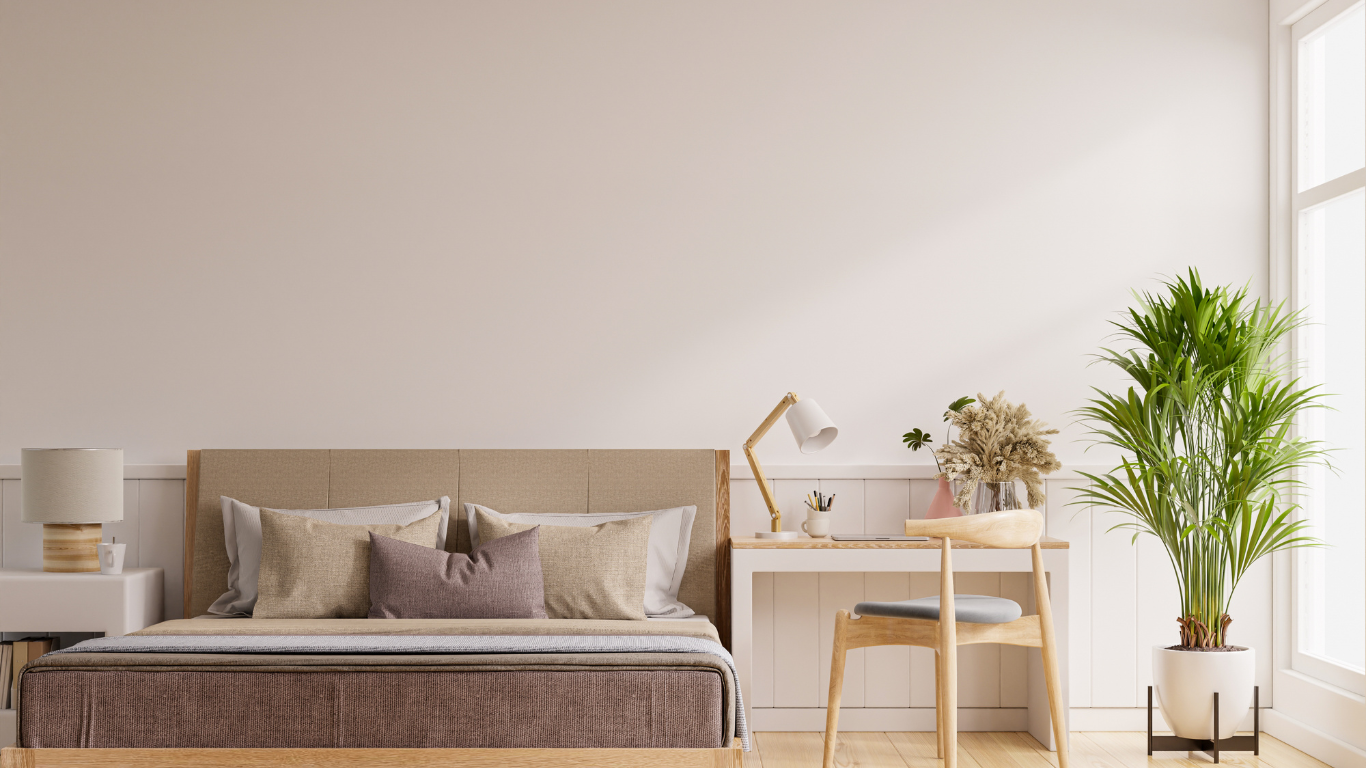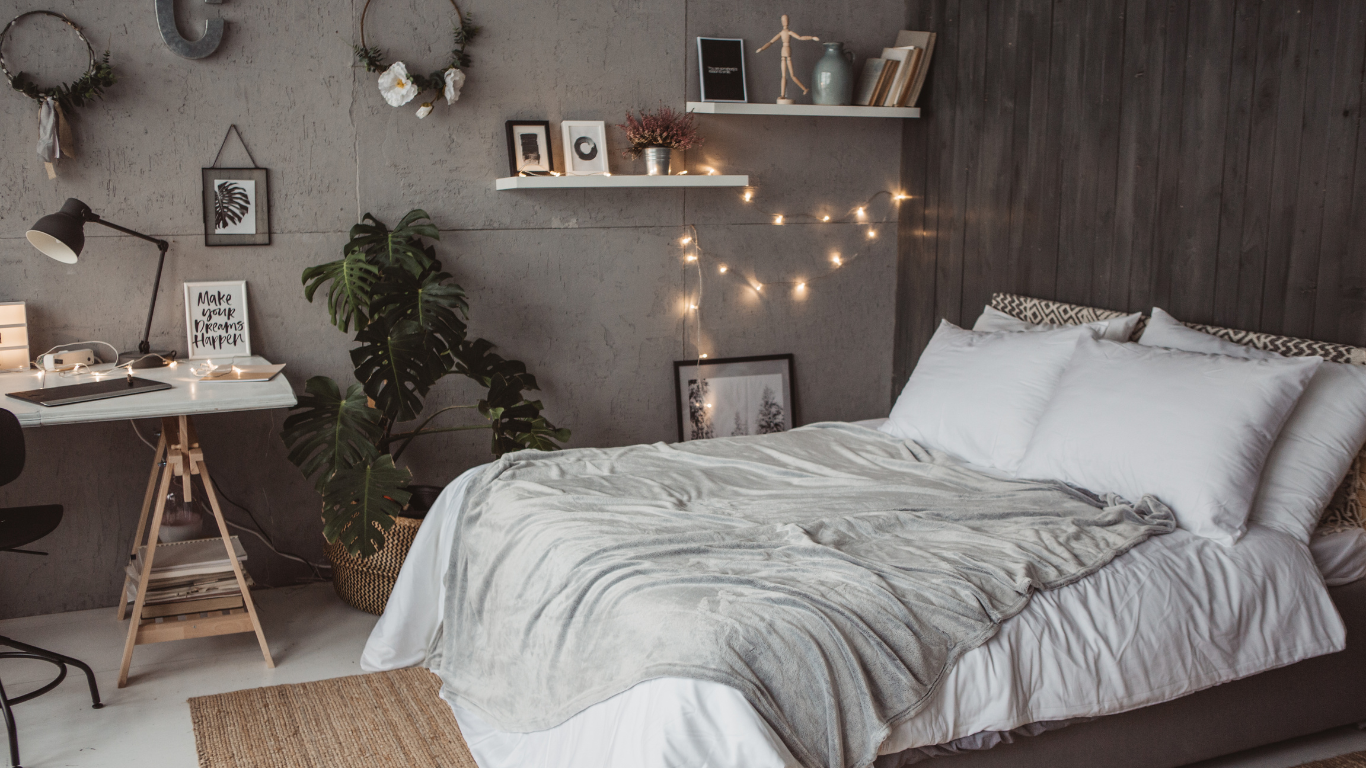The Connection Between Sleep Quality and Productivity
A good night’s sleep is not just a luxury; it’s a necessity for optimal productivity. Quality sleep enhances cognitive function, mood, and overall health, which are critical for maintaining high levels of performance at work and in daily life. Poor sleep, on the other hand, can lead to decreased focus, memory issues, and increased stress, all of which can severely hamper productivity. Given this strong connection, refreshing your bedroom to create an environment conducive to restful sleep is a practical step toward boosting your productivity.
Tips for Refreshing Your Bedroom for Better Sleep and Productivity
 1. Declutter and Organize
1. Declutter and Organize
A cluttered space can lead to a cluttered mind. Start your bedroom refresh by decluttering and organizing your space. Keep only essential items in your bedroom and find a place for everything. Use storage solutions like under-bed bins, closet organizers, and nightstands with drawers to keep surfaces clear.
2. Optimize Your Bed Placement
The position of your bed can significantly impact your sleep quality. Ideally, place your bed against the longest wall in the room, away from windows and doors. This placement can create a sense of security and minimize disturbances from outside noise or light. Ensure that your bed is the focal point of the room, promoting a sense of relaxation and comfort.
3. Choose Soothing Colors
Colors can influence mood and sleep quality. Opt for soothing, neutral tones like soft blues, greens, or grays for your bedroom walls and decor. These colors have a calming effect and can help create a serene environment conducive to sleep.
4. Invest in Quality Bedding
Comfortable and supportive bedding is crucial for good sleep. Invest in a high-quality mattress that suits your sleep preferences, whether it’s firm, medium, or soft. Choose pillows that provide proper neck support and breathable, soft sheets and blankets to enhance comfort.
5. Control Light and Noise
Exposure to light and noise can disrupt sleep. Install blackout curtains or shades to block out external light and reduce noise with thick rugs, curtains, or a white noise machine. Consider using a sleep mask and earplugs if your bedroom is particularly noisy or bright.
6. Create a Relaxation Zone
Dedicate a corner of your bedroom to relaxation. This area can include a comfortable chair, a small bookshelf, and a reading lamp. Use this space for quiet activities like reading, meditation, or journaling before bed. Keeping your relaxation zone separate from your work or entertainment areas can help signal to your brain that it’s time to wind down.
Tips for Maintaining a Productive Routine

1. Separate Work and Sleep Spaces
If you need to work from your bedroom, create a clear distinction between your work and sleep areas. Use a small desk and ergonomic chair for your workspace and keep it as far from your bed as possible. This separation helps maintain a psychological boundary between work and rest, preventing your brain from associating your bed with work-related stress.
2. Establish a Nighttime Routine
A consistent nighttime routine can signal to your body that it’s time to sleep. Start winding down an hour before bed by turning off electronic devices, dimming the lights, and engaging in relaxing activities. Consider incorporating practices like reading, gentle stretching, or listening to calming music into your routine.
3. Use Smart Lighting
Smart lighting can help regulate your sleep-wake cycle. Use dimmable lights or smart bulbs that can mimic natural daylight patterns. Set your lights to gradually dim in the evening to promote relaxation and gradually brighten in the morning to help you wake up naturally.
4. Keep a Consistent Sleep Schedule
Consistency is key to good sleep. Try to go to bed and wake up at the same time every day, even on weekends. This routine helps regulate your body’s internal clock, making it easier to fall asleep and wake up feeling refreshed.
Partitioning Your Bedroom Space
Creating distinct zones in your bedroom can help enhance both sleep and productivity. Here’s how you can effectively partition your space:
- Sleeping Zone: This area should be centered around your bed. Keep it free of work-related items and distractions. Use calming decor and ensure your bed is comfortable and inviting.
- Work Zone: If you need to work in your bedroom, designate a specific area for your workspace. A small desk, ergonomic chair, and good lighting are essential. Keep this area organized and clutter-free to promote focus.
- Relaxation Zone: Create a cozy corner with a comfortable chair or a small sofa, a reading lamp, and a few books or magazines. This area can be used for winding down in the evening or taking short breaks during the day.
- Storage Zone: Use closets, dressers, and storage bins to keep your bedroom tidy. Ensure that storage solutions are easily accessible but do not encroach on your sleep or work areas.

Conclusion
Refreshing your bedroom can have a profound impact on your sleep quality and productivity. By decluttering, optimizing your bed placement, choosing soothing colors, investing in quality bedding, controlling light and noise, and creating distinct zones for sleep, work, and relaxation, you can create an environment that supports both restful sleep and productive days. Implement these tips and watch as your sleep quality improves, leading to increased focus, better mood, and enhanced productivity.



